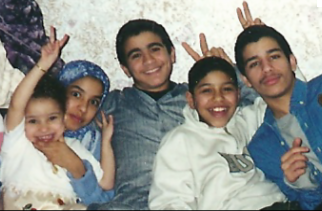 Omar Khadr (centre in the picture at left) was born in Toronto, Canada on September 19, 1986. His father was an Egyptian born Canadian who ran charities to provide food and education for orphans, and was an old friend of Osama Bin Laden. His mother was a Canadian of Palestinian descent. Omar spoke four languages fluently. When he was 15, his family sent him to accompany a group as a translator. The US military identified that group as Al Qaeda.
Omar Khadr (centre in the picture at left) was born in Toronto, Canada on September 19, 1986. His father was an Egyptian born Canadian who ran charities to provide food and education for orphans, and was an old friend of Osama Bin Laden. His mother was a Canadian of Palestinian descent. Omar spoke four languages fluently. When he was 15, his family sent him to accompany a group as a translator. The US military identified that group as Al Qaeda.
In July 2002, US Special Forces attacked the camp where he was staying. When US military entered the site, Omar was buried face down under rubble, blinded by shrapnel and crippled. Another man was beside him. US military documents say a US militant stood on top of Omar's body before realizing that someone was buried beneath. The first US fighter to arrive on the scene shot the man beside Omar dead and then shot Omar twice in the back, leaving two large exit wounds in his chest and chunks of his chest and shoulder ... blown out. He was somehow identified as being the son of his father, either before or after a second US militant prevented the first from shooting him again. He was consequently captured instead.
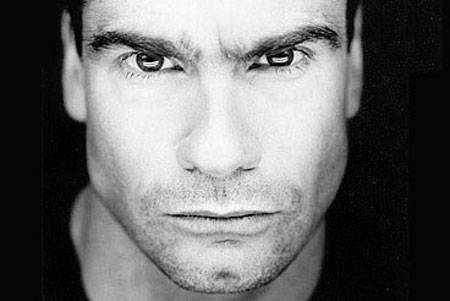 Henry Rollins interview by Maximus D. Estevez and Jonathan "Toth" Getzschman: full text available here. Submitted by Jonathan "Toth" Getzschman.
Henry Rollins interview by Maximus D. Estevez and Jonathan "Toth" Getzschman: full text available here. Submitted by Jonathan "Toth" Getzschman.
"I don’t go to CNN for news like I don’t go to a Burger King for a meal."
Max: In America's search for transparency, new organizations have been formed, such as Wikileaks. America is torn on that specific issue. Some view it as treason. Others view it as patriotism. What is your take on the subject?
Henry: If WikiLeaks is treason, then so was the outing of CIA agent Valerie Plame [VP Dick Cheney called her and her husband "Fair Game" after they proved and announced to the media that Bush was lying about Saddam Hussein's WMD's] and let’s get everyone into court and get it going. If America has so many things that we are not supposed to know about, perhaps it’s time to change the way we do things. The way America conducts itself at this point only seems to lead to new conflicts. If America didn’t go to Iraq, there would be no deficit. Since the American media has been bought and paid for, some people need alternate sources to get their information.
I don’t go to CNN for news like I don’t go to a Burger King for a meal.
Max: In a time when many American's are wanting more transparency in government and to get their voices heard, what do you see as the most honorable and expedient way to get the government to listen to the will of the people?
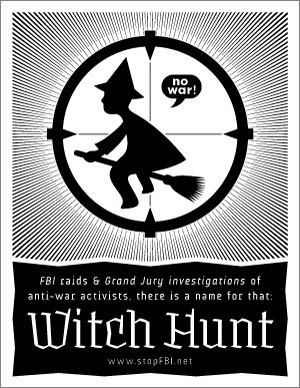 Antiwar and international solidarity activists, subjects of a federal grand jury investigation that alleges they may have provided “material support for terrorism,” uncovered documents on FBI guidelines and investigation practices left behind in an activist’s home that was raided in September of last year. The documents illuminate how the FBI has conducted surveillance of the activists being targeted in the investigation and further prove the grand jury is being used as a tool to go after political groups.
Antiwar and international solidarity activists, subjects of a federal grand jury investigation that alleges they may have provided “material support for terrorism,” uncovered documents on FBI guidelines and investigation practices left behind in an activist’s home that was raided in September of last year. The documents illuminate how the FBI has conducted surveillance of the activists being targeted in the investigation and further prove the grand jury is being used as a tool to go after political groups.
On September 24 of last year, the home of Lindon Gawboy and Mick Kelly, an activist who helped to organize a mass demonstration outside the Republican National Convention in 2008, was raided and subpoenaed. Gawboy was awoken by FBI pounding on her door. She came to the door and asked for a search warrant. The FBI ignored her request for a warrant and proceeded to use a battering ram, which took the door off its hinges and shattered a nearby fish tank.
The agents raiding Gawboy and Kelly’s home emptied file cabinets and desks and stacked files around the apartments. They set up and went through individual documents taking files away that were of interest to them. At some point during this process, an agent’s papers on the investigation became mixed in with Kelly’s files. And, presumably by chance, Gawboy found the revealed documents just weeks ago.
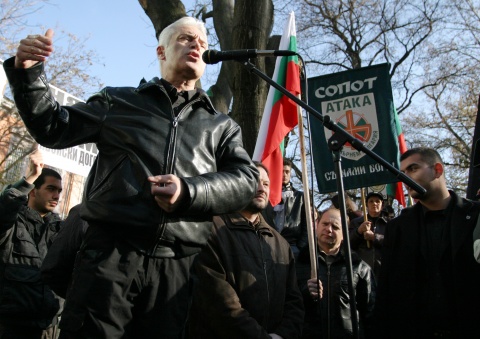
Diplomatic cables of the US embassy in Sofia have been revealed on WikiLeaks and provided to the project for investigative journalism www.bivol.bg, bringing out new details about the way Bulgaria's far-right, nationalist Ataka party and its leader, Volen Siderov, are viewed by American diplomats.
The text in English has also been published at the Balkanleaks site, an analogue of the notorious whistle-blowing WikiLeaks.
The first available cable on the subject has been sent on July 12, 2005, by then US Ambassador to Sofia, James Pardew, after it became known Ataka had secured seats in the Parliament as result of the general elections. In the cable, titled BULGARIA: EXTREME NATIONALIST PARTY ENTERS PARLIAMENT, the diplomat writes about the policies of Ataka and Siderov, seen by him as xenophobic and anti-semitic, points out Ataka's parliamentary group includes a significant number of former military and police officials, gives a summary of Siderov's biography and work as journalist, talks about other key figures in the party and and notes undisclosed sources have informed him the nationalists might have received funding from Overgaz Chief Sasho Donchev and Nove Holding owner Vassil Bozhkov aka The Scull.
In a cable, dated October 17, 2005, titled PROGRESS ON U.S. MILITARY ACCESS, BUT TOUGH ISSUES REMAIN, the then Charge d'Affaires of the US Embassy Jeffrey D. Levine points out the nationalists lead an anti-American campaign regarding US military bases.
 New US International Cybersecurity Strategy Aims to Institute 'Rule of Law' on the Internet
New US International Cybersecurity Strategy Aims to Institute 'Rule of Law' on the Internet
The United States officially launched its international cyber security strategy in a White House event on Monday, May 16. Secretary of State Hillary Clinton joined by the following administration officials: John Brennan, the president's counterterrorism and homeland security adviser; Howard Schmidt, White House cybersecurity coordinator; Attorney General Eric Holder; Secretaries Janet Napolitano of Homeland Security and Gary Locke of Commerce; and Defense Deputy Secretary William Lynn.
The presentation of the cyber security presented several principles, outlined the approach the US intends to take in the further development of cyber security protections, and indicated how the US might use the Internet to preserve its status as a superpower in the world.
Featured during the presentation were seven principles, which appear in the framework: economic engagement, protecting networks, law enforcement, military cooperation, multi-stakeholder Internet governance, international development and Internet freedom. Within the presentation, Clinton sought to explain that cyber crime, Internet freedom and network security could no longer be “disparate stovepipe discussions.”
At no time during the launch of the strategy was WikiLeaks mentioned. Not even Clinton bothered to mention it, despite the fact that she heads a State Department that had their department’s classified information leaked and published by media organizations and continue to have new information published each day.
 For the past four or five days, a copy of a leaked confidentiality agreement from WikiLeaks has been a hot topic among those who follow news and politics. Those that have regularly scrutinized WikiLeaks, who have typically gone along with any meme in the media that shines a light on the organization’s imperfections, took the posting of this agreement as an opportunity to focus on how this showed complete hypocrisy. Those sympathetic and supportive, on the other hand, saw this as a moment when they needed to get out in front and defend the organization.
For the past four or five days, a copy of a leaked confidentiality agreement from WikiLeaks has been a hot topic among those who follow news and politics. Those that have regularly scrutinized WikiLeaks, who have typically gone along with any meme in the media that shines a light on the organization’s imperfections, took the posting of this agreement as an opportunity to focus on how this showed complete hypocrisy. Those sympathetic and supportive, on the other hand, saw this as a moment when they needed to get out in front and defend the organization.
I was one of those people who found the renewed push to further de-legitimize WikiLeaks concerning. I posted an analysis of the confidentiality agreement and later posted a comprehensive and thought-out critique of David Allen Green's work on WikiLeaks. (Green is the blogger for the New Statesman, who helped make the agreement a big story.)
As the story was breaking, I received a Twitter message, “WikiLeaks Threatens Its Own Leakers With $20 Million Penalty" http://bit.ly/klgAnz What says @kgosztola?” The message came from Roni Weiss, a personality on a podcast show called “Don’t Worry About the Government.” I told him he should have me on his program to share my opinion.
On Facebook, we went back and forth on the “Don’t Worry About the Government” show page as I tried to get him to do a segment with me. He stated his position, “My biggest concern is that I just don't have much to say about it…My stance is basically: This looks bad for them, publicity-wise, and beyond that, I don't really care, because they do a lot of things that look bad.
 BBC’s report on US State Embassy cables from WikiLeaks detailing the “hidden agenda” of northern Arctic states has led Greenpeace to call “on the Arctic Council to place an immediate moratorium on industrial exploitation within the area that has historically been covered by sea ice.”
BBC’s report on US State Embassy cables from WikiLeaks detailing the “hidden agenda” of northern Arctic states has led Greenpeace to call “on the Arctic Council to place an immediate moratorium on industrial exploitation within the area that has historically been covered by sea ice.”
Truls Gulowsen, Arctic campaign leader for Greenpeace Nordic, writes, “What the Arctic needs in this time of extreme external pressure is a protection against additional threats from dangerous shipping, oil exploitation, bottom-trawling, over-fishing and other destructive industrial practices.” Gulowsen also points out the “more immediate and more dangerous safety issue” is that moves into the “fragile Arctic to drill for oil” will create a threat of oil spills and likely impact the marine environment.
The Financial Times post on the cables highlights some of the noteworthy revelations in the cables:
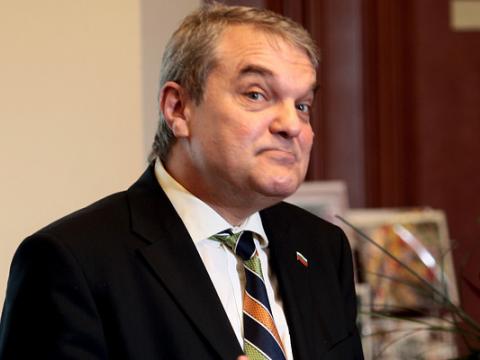
Former Interior Minister of Bulgaria (2005-2008), Rumen Petkov is presented as a "hard working, hard drinking", controversial figure, related to political corruption and russian intelligence in a WikiLeaks diplomatic cable released by the Wikileaks partner Bivol.bg also published on balkanleaks.eu
Before his appointment as a Minister, Petkov was the mayor of the central Bulgarian city of Pleven where he was "dogged by scandals, some serious and some -- like his late night arrest for urinating in a public fountain --simply illustrative of his unpolished style" - wrote the American ambassador in Sofia.
Rumen Petkov became one of the most influential personalities in the Bulgarian government under PM Stanishev (2005-2009).
His past associations with controversial figures may make it difficult for him to move against certain Organized Crime interests - the Ambassador John Bayrle reported. He also believes Petkov has "long been publicly associated with Russians who are either directly or indirectly affiliated with Russian intelligence,"
While Petkov was a Minister "The five largest organized crime groups in Bulgaria (TIM, VIS, SIC, Nove Holding, and Multigroup) ... generally operated with impunity," Bayrle stated.
Petkov resigned in April 2008 after a huge political scandal following the revelation that he met with The Galevi Brothers, alleged drug lords. Despite the strong evidence that Petkov protected alleged criminals and shady alcool business from justice, Petkov was never investigated by the prosecutor office.
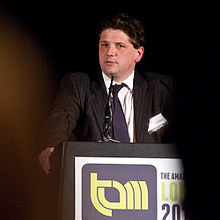 David Allen Green, legal correspondent for the New Statesman out of the UK, has spent the last few days calling attention to a leaked confidentiality or non-disclosure agreement (NDA), which he revealed in a blog post on May 11. Green has posted a second post on the agreement on his blog, Jack of Kent, and will be posting a summary to the New Statesman website on May 16, which last time I checked, he intends to glibly title, "NDAs for Dummies."
David Allen Green, legal correspondent for the New Statesman out of the UK, has spent the last few days calling attention to a leaked confidentiality or non-disclosure agreement (NDA), which he revealed in a blog post on May 11. Green has posted a second post on the agreement on his blog, Jack of Kent, and will be posting a summary to the New Statesman website on May 16, which last time I checked, he intends to glibly title, "NDAs for Dummies."
I published an initial analysis of the leaked agreement on WL Central. The analysis was featured as a “Best Opinion” in an “Irony Alert” blog post on the agreement on The Week’s website.
Green, who is the blogger who was the first to draw attention to the agreement, called it a “draconian and extraordinary legal gag that WikiLeaks imposes on its own staff” and, in particular, focused on Clause 5 of the agreement that “imposes a penalty of ‘£12,000,000 – twelve million pounds sterling’ on anyone who breaches this legal gag.”
In his follow-up post, which cites the analysis I wrote, he groups me with others who “sought to explain the document away: to normalize it and to contend that it is somehow unexceptional.” That is true. That is what I did.
He adds:
It may be well that for WikiLeaks partisans (like "the Birthers" in the United States), nothing - not even a disclosed document- will shift their adherence to their cause.
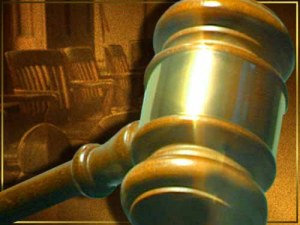 Edited podcast now posted.
Edited podcast now posted.
There are three high profile federal grand jury investigations. For each one, the argument could be made that the grand jury is chilling political action or seeking to criminalize people for associating with certain groups that are not charged with committing any crimes but instead are unsavory and illegitimate to the government.
The investigations being referred to are the investigation into Anonymous that is based in San Jose, California, the investigation into antiwar and international solidarity activists that is based in Chicago, Illinois, and the investigation into WikiLeaks that is based in Alexandria, Virginia.
Joining the "This Week in WikiLeaks" show this week is Jim Fennerty, who is a Chicago-based attorney defending the activists who were raided by the FBI in September of last year and now face a grand jury investigation. He is with the National Lawyers Guild and will be here to talk about his work defending the activists and will talk about the grand jury process and what those following the WikiLeaks might see happen in Alexandria as the investigation moves forward.
To listen to the show, click play on the widget below:
You can also listen to the show by going to this page. The podcast will appear in the list of "CMN News" episodes. Click the latest "This Week in WikiLeaks" episode and download. (The podcast can also be downloaded off of iTunes by searching for "CMN News" and then downloading the latest podcast.)

In the final week of January, twelve anti-war, labor and international solidarity activists were expected to appear before a grand jury in Chicago. They refused to go before the grand jury.
These activists from Chicago, the Twin Cities in Minnesota, and other areas have been subpoenaed over the past months. Several of the activists had their homes raided. Documents, cell phones, storage disks, computers, and children's artwork were seized from their home. The subpoenas indicated the FBI was looking for evidence that the activists had provided "material support for terrorism." And, it was discovered that the FBI had an informant, who went by the name of "Karen Sullivan," infiltrate an anti-war group in the Twin Cities.
This "witch-hunt" began on September 24th and, since then, U.S. Attorney Patrick Fitzgerald has been working to get activists to testify before a grand jury in Chicago. So far, all the activists have refused to participate in this "fishing expedition."
WL Central recently began posting coverage of this story. And, as the grand jury investigation into WikiLeaks and those who might be linked to WikiLeaks advances, it seems appropriate to provide context and shine a light on other stories of suppression of freedom and civil liberties in the United States.
Here is a profile of one of the activists (which I wrote and originally posted at OpEdNews.com in January):
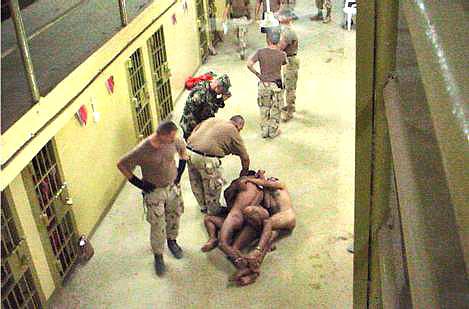 In 2010, WikiLeaks revealed through its release of the Iraq War Logs and its partnership with organizations like the Bureau of Investigative Journalism “303 allegations of [detainee] abuse by coalition forces were reported in the military files after 2004.” Then-Defense Secretary Donald Rumsfeld, who just published an op-ed in the Washington Post condemning WikiLeaks while at the same time using the information they have released to prop up his own views on US policy in the “war on terror,” pledged to “make changes as needed” to ensure that Abu Ghraib didn’t happen again.
In 2010, WikiLeaks revealed through its release of the Iraq War Logs and its partnership with organizations like the Bureau of Investigative Journalism “303 allegations of [detainee] abuse by coalition forces were reported in the military files after 2004.” Then-Defense Secretary Donald Rumsfeld, who just published an op-ed in the Washington Post condemning WikiLeaks while at the same time using the information they have released to prop up his own views on US policy in the “war on terror,” pledged to “make changes as needed” to ensure that Abu Ghraib didn’t happen again.
The Iraq War Logs proved changes had not been made. And now, with this new report out from The Investigative Fund at The Nation Institute and PBS’s Need to Know there is further confirmation that perpetrators of atrocities continue to go unpunished, those who allow for systemic abuse to continue have not been held accountable, and nothing has really changed since the Abu Ghraib scandal.
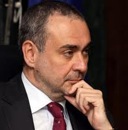
Bivol.bg (partial translation)
Bulgarian Chief Prosecutor, Boris Velchev, has painted an apocalyptic picture of the state of the prosecution services in the country at a meeting with American Ambassador, John Beyrle, held soon after Velchev’s election to the post. This has been revealed in a cable written by Beyrle, dated February 7, 2006, and leaked by Wikileaks [06SOFIA198].
The prosecutor’s office under the leadership of Velchev’s predecessor, Nikola Vilchev, was described by the new Chief Prosecutor as "some kind of terrorist organization" used to settle political and business scores, but totally incapable of fighting crime.
Empty files and hostile deputies, who did not even want to talk to him, is what Velchev stumbled upon at the prosecution services. He had described his priority of cleansing the institution from corrupt prosecutors as "some kind of a war".
Velchev’s “war,” however, has implications beyond the borders of Bulgaria – it must lead to effective guilty verdicts of organized crime bosses, one of the top requirements of the EU, monitoring Bulgaria before its accession to the Union.
Facing the outrageous failure of Bulgarian prosecutors and law enforcement to collect sound evidence against the leaders of organized crime, the Chief Prosecutor declares, according to Bayrle, his equally outrageous plan to seek “a contract with the Courts.” Ambassador Beyrle explains this means appealing to judges to sentence criminal bosses “based on evidence that otherwise might not pass muster“.
 A leaked confidentiality agreement that those doing “business” with WikiLeaks are expected to sign was obtained and published by the New Statesman. The New Statesman and other news organizations believe they have uncovered another aspect of the WikiLeaks organization that indicates it is unfit to be trusted by whistleblowers. But, for anyone who understands confidentiality agreements there may be nothing extraordinary or even draconian about the agreement.
A leaked confidentiality agreement that those doing “business” with WikiLeaks are expected to sign was obtained and published by the New Statesman. The New Statesman and other news organizations believe they have uncovered another aspect of the WikiLeaks organization that indicates it is unfit to be trusted by whistleblowers. But, for anyone who understands confidentiality agreements there may be nothing extraordinary or even draconian about the agreement.
A confidentiality agreement is essentially a non-disclosure agreement. Included are details noting the “owner of the information,” the “receiver of the information,” a definition of what it considers to be “information,” why the agreement is necessary, what information is covered by the agreement, a definition of the permitted use of the information, any exceptions to the agreement, and penalties that could be imposed if the agreement is breached.
What news organizations seem to be taking issue with, rather ridiculously, is the word “owner" and the idea that WikiLeaks might be marketing this information to media organizations.
The New Statesman and others consider the use of the word "owner" to be proof that the organization finds it has “commercial ownership over the information that has been leaked to it.” But, the word “owner” is the term that is used in these agreements. It is standard and may not be proof the organization sees itself as literally owning the information.
Clause by clause:
“A” stipulates the information that it finds to be covered by the agreement is defined.
GOP Leads Hearing on 'Improving' Whistleblower Provisions in Dodd-Frank Financial Reform Bill
 A hearing titled, “Legislative Proposals to Address the Negative Consequences of the Dodd-Frank Whistleblower Provisions,” was held today. Focused on proposed legislation from Rep. Michael Grimm (R-NY), the hearing looked at how to “improve” the Dodd-Frank Act by “preserving” the internal reporting mechanisms or processes that companies have setup for whistleblowers (e.g. hotlines).
A hearing titled, “Legislative Proposals to Address the Negative Consequences of the Dodd-Frank Whistleblower Provisions,” was held today. Focused on proposed legislation from Rep. Michael Grimm (R-NY), the hearing looked at how to “improve” the Dodd-Frank Act by “preserving” the internal reporting mechanisms or processes that companies have setup for whistleblowers (e.g. hotlines).
Rep. Grimm essentially argued that the changes in Dodd-Frank make it highly likely the “floodgate” will open. Frivolous claims and costly penalties will arise from the fact that whistleblowers are now allowed to go to the SEC before reporting fraud or corruption through a company’s internal reporting system.
Marcia Narine, a witness appearing before the committee on behalf of the US Chamber of Commerce, suggested Dodd-Frank provisions aim to treat all companies like criminals and assume if employees bring a tip documents will begin to be shredded to cover up corruption or fraud. She found this to be unfair and argued that companies are being penalized for not doing their job, for not paying attention to a whistleblower that had information on Bernie Madoff and was ignored.
Kenneth Daly of the National Association of Corporate Directors (NACD) asserted that the provisions in Dodd-Frank change the “emphasis from problem solving to getting paid for problem identification.” What developed later in the hearing was this conventional wisdom that whistleblowers could now be rewarded for malfeasance.

Update 2 - May 11 - 1:50 PM New York Time
This statement was posted by the Committee to Stop FBI Repression yesterday night. It is the latest on Hatem Abudayyeh, a Palestinian solidarity activist, who is one of twenty-three activists that has been subpoenaed to appear before a grand jury in Chicago.
From the statement:
On Friday, May 6th, the bank accounts of Hatem and Naima Abudayyeh of Chicago were frozen. The bank manager at the TCF (Twin Cities Federal) branch could not explain what had happened but stated that the Bank Security Act prevented him from releasing any assets.
In a strange turn of events, the bank admitted announced today (May 10) that they shut down the accounts, stating they no longer want to provide banking services to the Abudayyeh family. Simultaneously, TCF management informed the Abudayyehs today that they were issuing them a check for the value of their accounts.
Calls from across the United States ha an impact. A Code Pink activist from Washington, DC called US Attorney Patrick Fitzgerald's office and was told, "We've received hundreds of calls." The Office of Foreign Assets Control (OFAC) received numerous calls as well and "journalists from a National Public Radio affiliate, Al Jazeera and other agencies contacted them for an explanation."
The family's attorney, Michael Deutsch, says, "In my opinion, the bank did not act out of the blue. I suspect that the FBI and U.S Attorney investigation caused the bank to overreact and illegally freeze the Abudayyehs’ banking accounts that had been there for over a decade."
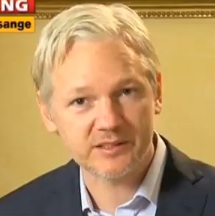 A federal grand jury is meeting at 11 am EST in Alexandria, Virginia. The grand jury is being employed to “build” a case against Julian Assange, the WikiLeaks founder who just won a gold medal for peace and justice from the Sydney Peace Foundation.
A federal grand jury is meeting at 11 am EST in Alexandria, Virginia. The grand jury is being employed to “build” a case against Julian Assange, the WikiLeaks founder who just won a gold medal for peace and justice from the Sydney Peace Foundation.
“The WikiLeaks case is part of a much broader campaign by the Obama administration to crack down on leakers,” writes Carrie Johnson of NPR. Johnson is one of a few reporters in the US press who has published a report today on this stirring development in the United States. She finds “national security experts” cannot “remember a time when the Justice Department has pursued so many criminal cases based on leaks of government secrets.”
The number of people subpoenaed to appear before the grand jury is unclear (and not in any of the few news articles published on the grand jury so far). What is known is that at least one individual from Cambridge was issued a subpoena seeking to compel him to testify before a Grand Jury. Glenn Greenwald of Salon.com reported the individual served had a public link to the WikiLeaks case and it was “highly likely” the subpoena was connected to the WikiLeaks Grand Jury investigation.
There are two other federal Grand Juries that are ongoing in the country. In San Jose, California, a Grand Jury has been empanelled to investigate the “hacktivist” group, Anonymous. Another Grand Jury in Chicago has been empanelled to target antiwar, labor and international solidarity activists for their political action.
Barrister and well known Australian refugee advocate Julian Burnside has kindly allowed Wikileaks Central to reprint his latest article on the refugee situation in Australia pertaining to the "Malaysian Solution" announced on 7th May 2011.
If Julia Gillard’s “Malaysian solution” tells us anything, it’s that Tony Abbott’s stop-the-boats mantra has redefined the debate on refugees.
The Prime Minister has previously committed to not doing any deals with countries that were not signatories of the United Nations refugee convention, such as Malaysia. So why has she done so now? Because Opposition Leader Tony Abbott has frightened her.
He has revived the bogeyman that former prime minister John Howard so skilfully exploited at the time of the Tampa incident and after it. He made sections of the public think that refugees are evil people who must be kept off our shores at all costs. They are actually deeply traumatised people who turn out, in most cases, to be ordinary, hardworking people fleeing persecution, but calling them “illegals” proved to be very effective at demonising them.
When Kevin Rudd became prime minister, the government’s stance on boat people changed significantly. Six months later, the government made sweeping changes to the use of detention and delivered 90% of what people like me were asking for. All of those advances were lost within weeks of Abbott taking over as opposition leader, because he started beating the drum about the evils of boat people coming here.
This new plan is crazy. We know Malaysia is not a signatory to the UNHCR convention. We know Malaysia has a bad track record in its treatment of asylum seekers. We do not know what protections are built into the MOU and we don’t know what it will cost Australia. We don’t know what it will cost us parking 800 refugees there or receiving the 4000 Burmese here.
Traditional media organizations, especially those in the United States, are afraid of WikiLeaks. It threatens their position in society.
The new "leaks portal" launched by the Wall Street Journal called "SafeHouse" is not just a shoddy excuse of a system for accepting leaks from "sources" but a sign that the WSJ is afraid of WikiLeaks and how the organization is transforming journalism.
In an up-and-coming documentary on the New York Times, "Page One: A Year Inside the New York Times," executive editor of the Times Bill Keller says on-camera, "The bottom line is, WikiLeaks doesn't need us. Daniel Ellsberg did.” That reality has likely fueled the tension between Julian Assange and WikiLeaks and Bill Keller and the Times.
At the 2011 National Conference for Media Reform (NCMR) in Boston about a month ago, Greg Mitchell, blogger for The Nation, who has been blogging all things WikiLeaks since the release of the US State Embassy cables began, was present for a panel on WikiLeaks. The panel, in addition to Mitchell, featured Amy Goodman, Glenn Greenwald, Micah Sifry, Emily Bell, and Christopher Warren. [The full panel can be viewed here.]
I had the privilege of interviewing Mitchell the day after the panel for The Nation.
[Full disclosure: I currently serve as an intern for The Nation and I happen to assist Mitchell on a daily basis.]
 Edited podcast now posted.
Edited podcast now posted.
This week's podcast features Michael K. Busch, who teaches international relations at the City College of New York, where he is also program coordinator at the Colin Powell Center for Policy Studies. He has been covering the Gitmo Files in detail. He has also covered released cables on his site WikiBlogged, and he is listed as a resource in the back of Greg Mitchell's published book, "Age of WikiLeaks," which you can purchase in print on Blurb.com or in e-book form off of Amazon. [Follow him on Twitter @michaelkbusch]
On the program, we discuss the killing of Osama bin Laden in the context of the Pakistan Cables that one media organization, The Hindu (in India), covered extensively. We also talk about the files Busch has covered extensively and what his thoughts are on the release in general. And, the show discusses the Journal's newly launched SafeHouse, a WikiLeaks-imitation website it hopes "sources" will "leak" to like "sources" have leaked to WikiLeaks. [For more on this, WL Central coverage can be found here.]
Theme by Danetsoft and Danang Probo Sayekti inspired by Maksimer